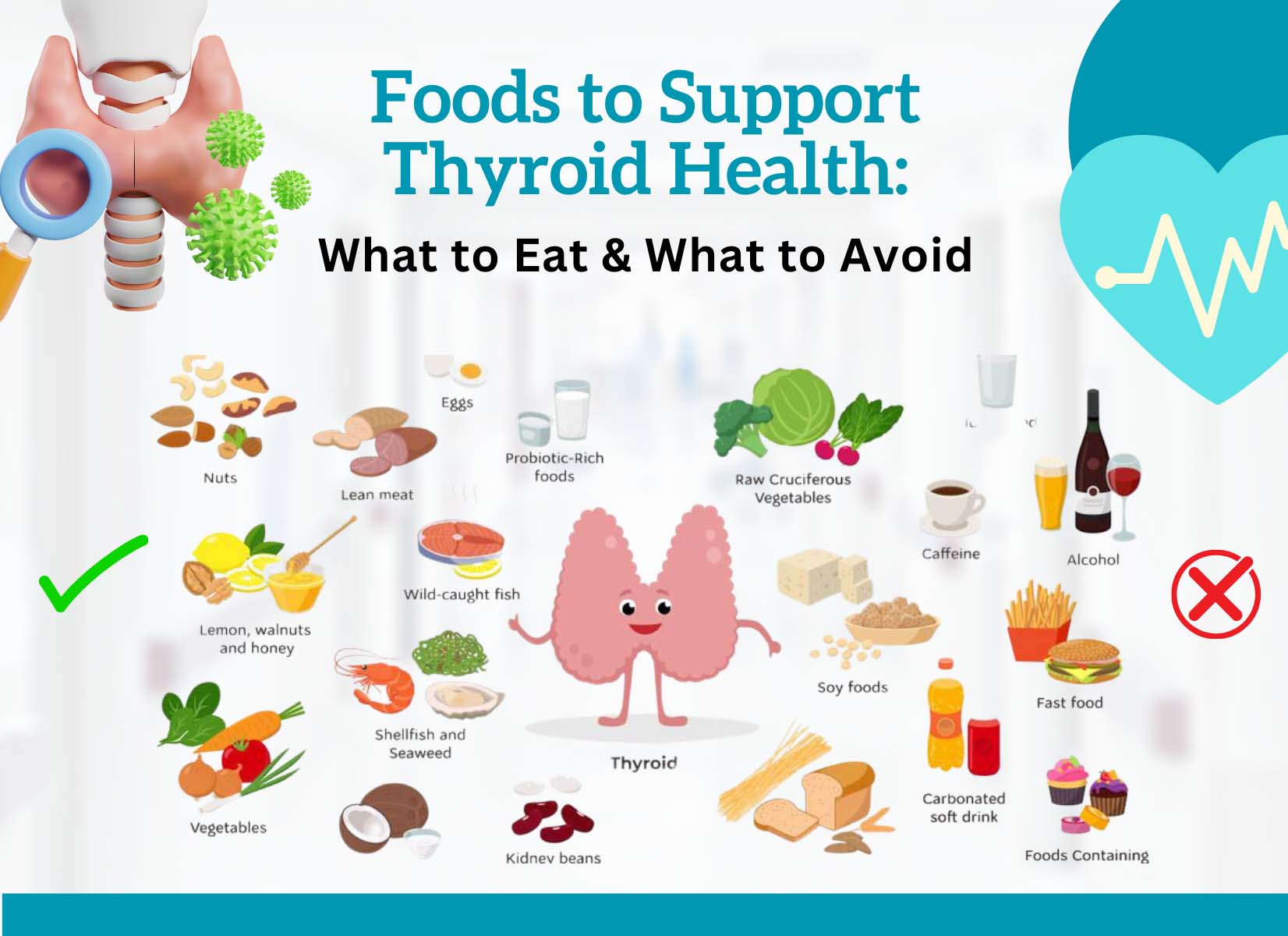Your thyroid gland plays a vital role in maintaining your overall health by regulating metabolism, energy production, and hormone balance. The foods you eat can significantly influence your thyroid’s function. Whether you’re managing hypothyroidism, hyperthyroidism, or simply want to support your thyroid, here’s a guide to the best foods to include and those to avoid for optimal thyroid health.
What to Eat for Thyroid Health
- Iodine-Rich Foods
Iodine is essential for thyroid hormone production. Incorporate these foods into your diet:- Seaweed: Kelp, nori, and wakame are excellent sources of iodine.
- Fish: Fatty fish like salmon and cod provide iodine and omega-3 fatty acids, which are great for reducing inflammation.
- Dairy: Milk, yogurt, and cheese are rich in iodine.
However, excessive iodine intake can be harmful, so consume these in moderation.
- Selenium-Rich Foods
Selenium is a powerful antioxidant that helps protect the thyroid gland from oxidative damage and supports hormone production. Foods high in selenium include:- Brazil nuts: Just one or two a day can meet your selenium requirements.
- Eggs: Both the yolk and white are good sources.
- Sunflower seeds: A handy snack packed with selenium.
- Zinc-Rich Foods
Zinc is vital for thyroid function and hormone synthesis. Include these in your meals:- Shellfish: Oysters, crab, and lobster are great options.
- Nuts and seeds: Pumpkin seeds and cashews are excellent zinc sources.
- Whole grains: Quinoa and oats can provide a zinc boost.
- Foods Rich in Vitamin D
Vitamin D deficiency has been linked to autoimmune thyroid conditions. To ensure adequate intake:- Spend time in sunlight for natural vitamin D.
- Include fortified foods like milk and orange juice in your diet.
- Eat fatty fish like mackerel or tuna.
- Antioxidant-Rich Fruits and Vegetables
Antioxidants help combat inflammation, which can affect thyroid health. Include these:- Berries: Blueberries, strawberries, and raspberries are antioxidant powerhouses.
- Leafy greens: Spinach, kale, and Swiss chard are nutrient-rich and support overall health.
- Cruciferous vegetables in moderation: While these can be beneficial, excessive amounts may interfere with thyroid function, especially if consumed raw.
- Healthy Fats
Healthy fats are necessary for hormone production and overall thyroid health. Include:- Avocados: Rich in monounsaturated fats and antioxidants.
- Olive oil: A heart-healthy choice that reduces inflammation.
- Nuts: Almonds and walnuts provide essential fatty acids and nutrients.
- Lean Protein Sources
Protein helps stabilize blood sugar levels and supports thyroid function. Include lean sources like:- Chicken and turkey: Excellent low-fat protein options.
- Legumes: Lentils, chickpeas, and black beans are plant-based protein sources.
What to Avoid for Thyroid Health
- Excessive Goitrogenic Foods
Goitrogens can interfere with thyroid hormone production. While moderate consumption is generally safe, excessive intake of raw forms of these foods should be avoided:- Cruciferous vegetables: Broccoli, cauliflower, Brussels sprouts, and cabbage.
- Soy products: Tofu, soy milk, and soybeans may hinder thyroid function in large amounts.
- Processed Foods and Sugary Snacks
Processed foods often contain high amounts of salt, sugar, and unhealthy fats that can exacerbate inflammation and impact thyroid function. Avoid:- Packaged snacks like chips and cookies.
- Sugary drinks and sodas.
- Fast food loaded with trans fats.
- Gluten for Those with Sensitivities
If you have an autoimmune thyroid condition, such as Hashimoto’s thyroiditis, gluten may trigger inflammation. Consider eliminating:- Foods made from wheat, barley, or rye.
- Processed bread and pasta that contain gluten.
- High-Sodium Foods
While iodine is important, consuming too much sodium, especially from processed sources, can harm your thyroid and overall health. Limit:- Canned soups and frozen meals.
- Salty snacks like pretzels.
- Alcohol
Alcohol can interfere with thyroid hormone levels and impair the gland’s ability to produce hormones. Minimize or avoid:- Beer, wine, and hard liquors.
- Excessive Caffeine
High caffeine intake can disrupt hormone balance and increase stress levels, which may affect thyroid health. Avoid:- Multiple cups of coffee in a day.
- Energy drinks and high-caffeine teas.
Conclusion
Supporting your thyroid through proper nutrition is key to maintaining its function and improving overall health. Focus on a balanced diet that includes essential nutrients such as iodine, selenium, zinc, and vitamin D, while limiting foods that may negatively affect thyroid function.If you’re experiencing symptoms of thyroid imbalance, such as fatigue, weight changes, or mood swings, consult a doctor promptly. At Vasavi Hospitals, the best hospital in Bangalore, our experienced general physician in Kumaraswamy Layout can help diagnose and manage your thyroid concerns.
